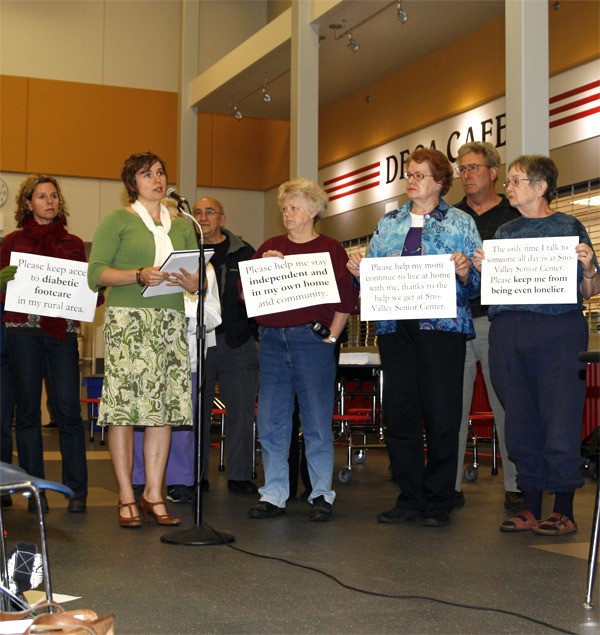Herman Schey balanced on his toes, bent his knees and crunched his stomach. Then the medicine balls started flying.
The North Bend resident, one of more than a dozen seniors in the Senior-cise class at Mount Si Senior Center, had to catch at least 10 balls to earn lunch privileges.
“C’mon, Herman,” called out instructor Merlyn Talbot. “You’re ready for your lunch now: Salisbury steak.”
“Oh, that sounds good!” he replied.
Schey and his fellow seniors kept up a good routine in Talbot’s Thursday, Oct. 14, morning workout.
“I’m huffing and puffing, because I’m 88 years old,” he said. Still, he has no complaints. If it weren’t for the senior center and its activities, Talbot might have to fend for himself to find social activities as well as exercise.
“I like the place and I like the people,” he said. “I like the lunch, too. Three bucks, you can’t beat that.”
Representatives of both the Mount Si center and the Sno-Valley Senior Center in the Lower Valley made the case for members like Schey at a Tuesday, Oct. 12, public hearing at Mount Si High School on King County’s beleaguered budget.
Council members Julia Patterson, Kathy Lambert, Jane Hague, Larry Phillips, Reagan Dunn, Larry Gossett and Jan Drago listened as seniors joined representatives from human services programs, local cities and the community at large to plead for support for various programs. Faced with a $60 million deficit next year, the executive’s budget eliminates human services funding.
Senior centers
For now, the senior centers appear to among the lucky ones. Both centers expect to receive $24,500 apiece through the county’s Community Services Division as part of Executive Dow Constantine’s proposed 2011 budget. Members were on hand to make sure that the council keeps it there.
“We are a lifeline to the seniors in the Valley,” Sno-Valley Center Director Amara Oden told council. She was flanked by a half-dozen members who hoisted signs personalizing the meal, transportation and social services that the center provides.
In many cases, senior centers are older adults’ only outlet and resource, Oden said. Without the meals and social safety net, many seniors would lose their independence.
“We’re able to keep them at home and in our community,” Oden said.
Mount Si Senior Center Director Ruth Tolmasoff said that, without a 2010 cost-of-living adjustment for Social Security, the centers become even more important.
“In these difficult economic times, we are seeing more and more people who need our help,” Tolmasoff said. New faces come nearly every day, she added.
County funds make up about 13 percent of Mount Si Senior Center’s resources. But most other funds are already earmarked, allowing the center to use it were it’s most needed.
“It’s money that keeps the doors open,” said Tolmasoff, who thanked the county executive for preserving funds that might otherwise be cut.
Human services
Other speakers at the Tuesday forum called for county support for roads and police, family court services, teen offender rehabilitation, domestic violence programs and flood control.
The mayors of Snoqualmie and North Bend both called on the council to preserve support for the county flood district. That a new taxing district faces challenges next year, when some parts of the county will hit the state-imposed $5.90 property tax cap.
Snoqualmie Mayor Larson said the district has helped raise 70 homes in the last three years—as many as the city was able to push through on its own in the prior seven.
“It’s not throwing money away,” he said. “It’s a huge investment that pays back in spades.”
“I don’t envy you,” North Bend Mayor Ken Hearing told the council. “We’re going through a similar process. We need to live within our means right now, because this is how it’s going to be.”
Hearing called on the council to help maintain rural law enforcement and roads. If the county fails to keep up failing roads now, it will only cost more to fix them in the future, he added.
Fall City resident Nancy Moore also stressed keeping rural deputies. The King County Sheriff’s Office is slated to cut 28 deputies in 2011.
“I find it hard to believe that residents of unincorporated King County are less deserving of police protection,” she said.
Fall City resident Vanessa Allen urged the council to preserve funding for the court-appointed special advocate program, also known as CASA.
County CASA funding, which helps volunteers who advocate for abused and neglected children in dependency court, is slated for elimination.
But Allen said the funds have been well spent. She related how her advocacy has turned children’s lives around.
“This is a program that works,” Allen said. “Very often, the only person who is a constant in these cases is a CASA.”
She called the program “inexpensive insurance to ensure these kids do not go back into the system later.”
• The county council will continue to take public input this fall prior to a final decision in late November. A final public hearing is 6:30 p.m. Tuesday, Oct. 19, at the Maleng Regional Justice Center in Kent.



